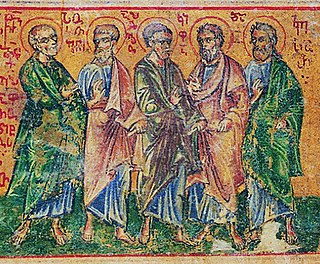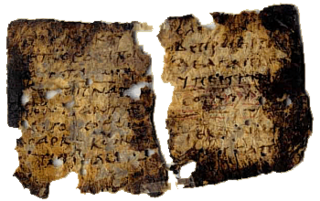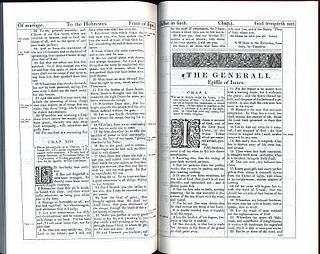
Apollos was a 1st-century Alexandrian Jewish Christian mentioned several times in the New Testament. A contemporary and colleague of Paul the Apostle, he played an important role in the early development of the churches of Ephesus and Corinth.

Barnabas, born Joseph (Ἰωσήφ) or Joses (Ἰωσής), was according to tradition an early Christian, one of the prominent Christian disciples in Jerusalem. According to Acts 4:36, Barnabas was a Cypriot Levite. Identified as an apostle in Acts 14:14, he and Paul the Apostle undertook missionary journeys together and defended Gentile converts against the Judaizers. They traveled together making more converts, and participated in the Council of Jerusalem. Barnabas and Paul successfully evangelized among the "God-fearing" Gentiles who attended synagogues in various Hellenized cities of Anatolia.

The Gospel of Barnabas is a non-canonical, pseudepigraphical gospel written during in the Late Middle Ages and attributed was to the early Christian disciple Barnabas, who is one of the apostles of Jesus. It is about the same length as the four canonical gospels combined and largely harmonizes stories in the canonical gospels with Islamic elements such as the denial of Jesus' crucifixion. The gospel presents a detailed account of the life of Jesus. It begins with the nativity of Jesus, which includes the annunciation by the archangel Gabriel to Mary which precedes Jesus' birth. The gospel follows his ministry, ending with the message of Jesus to spread his teachings around the world. Judas Iscariot replaced Jesus at the crucifixion.

Pseudo-Dionysius the Areopagite was a Greek author, Christian theologian and Neoplatonic philosopher of the late 5th to early 6th century, who wrote a set of works known as the Corpus Areopagiticum or Corpus Dionysiacum.

The Epistle of Barnabas is an early Christian Greek epistle written between AD 70 and 132. The complete text is preserved in the 4th-century Codex Sinaiticus, where it appears at the end of the New Testament, following the Book of Revelation and before the Shepherd of Hermas. For several centuries, it was one of the "antilegomena" ("disputed") writings that some Christians looked at as sacred scripture, while others excluded them. Eusebius of Caesarea classified it with excluded texts. It is mentioned in a perhaps third-century list in the sixth-century Codex Claromontanus and in the later Stichometry of Nicephorus appended to the ninth-century Chronography of Nikephoros I of Constantinople. Some early Fathers of the Church ascribed it to the Barnabas mentioned in the Acts of the Apostles, but it is now generally attributed to an otherwise unknown early Christian teacher. It is distinct from the Gospel of Barnabas.

The Didache, also known as The Lord's Teaching Through the Twelve Apostles to the Nations, is a brief anonymous early Christian treatise written in Koine Greek, dated by modern scholars to the first or second century AD.
An apostolic see is an episcopal see whose foundation is attributed to one or more of the apostles of Jesus or to one of their close associates. In Catholicism, the phrase "The Apostolic See" when capitalized refers specifically to the See of Rome.

Pseudepigrapha are falsely attributed works, texts whose claimed author is not the true author, or a work whose real author attributed it to a figure of the past. The name of the author to whom the work is falsely attributed is often prefixed with the particle "pseudo-", such as for example "pseudo-Aristotle" or "pseudo-Dionysius": these terms refer to the anonymous authors of works falsely attributed to Aristotle and Dionysius the Areopagite, respectively.
The Apostolic Fathers, also known as the Ante-Nicene Fathers, were core Christian theologians among the Church Fathers who lived in the 1st and 2nd centuries AD who are believed to have personally known some of the Twelve Apostles or to have been significantly influenced by them. Their writings, though widely circulated in early Christianity, were not included in the canon of the New Testament. Many of the writings derive from the same time period and geographical location as other works of early Christian literature which came to be part of the New Testament.

The Council of Jerusalem or Apostolic Council is a council described in chapter 15 of the Acts of the Apostles, held in Jerusalem c. 48–50 AD.

The New Testament apocrypha are a number of writings by early Christians that give accounts of Jesus and his teachings, the nature of God, or the teachings of his apostles and of their lives. Some of these writings were cited as scripture by early Christians, but since the fifth century a widespread consensus has emerged limiting the New Testament to the 27 books of the modern canon. Roman Catholic, Eastern Orthodox, and Protestant churches generally do not view the New Testament apocrypha as part of the Bible.

The Acts of Barnabas is a non-canonical pseudepigraphical Christian work that claims to identify its author as John Mark, the companion of Paul the Apostle, as if writing an account of Barnabas, the Cypriot Jew who was a member of the earliest church of Jerusalem; through the services of Barnabas, the convert Saul was welcomed into the apostolic community. Three pseudepigraphical works are linked with the name of Barnabas: the Epistle of Barnabas, written between AD 70 and 135, this Acts and the medieval text Gospel of Barnabas. None of them have been accepted into the biblical canon.

The seventy disciples, known in the Eastern Christian traditions as the seventy apostles, were early emissaries of Jesus mentioned in the Gospel of Luke. The number of those disciples varies between either 70 or 72 depending on the manuscript.
In the Catholic Church, an apostolic visitor is a papal representative with a transient mission to perform a canonical visitation of relatively short duration. The visitor is deputed to investigate a special circumstance in a diocese or country, and to submit a report to the Holy See at the conclusion of the investigation.
The Apostolic Constitutions or Constitutions of the Holy Apostles is a Christian collection divided into eight books which is classified among the Church Orders, a genre of early Christian literature, that offered authoritative pseudo-apostolic prescriptions on moral conduct, liturgy and Church organization. The work can be dated from 375 to 380 CE. The provenance is usually regarded as Syria, probably Antioch. The author is unknown, although since James Ussher it has been often considered to be the same author as that of the letters of Pseudo-Ignatius, perhaps the 4th-century Eunomian bishop Julian of Cilicia.

John Mark is named in the Acts of the Apostles as an assistant accompanying Paul and Barnabas on their missionary journeys. Traditionally he is regarded as identical with Mark the Evangelist, the traditional writer of the Gospel of Mark.

Aristobulus of Britannia is a Christian saint named by Hippolytus of Rome (170–235) and Dorotheus of Gaza (505–565) as one of the Seventy Disciples mentioned in Luke 10:1–24 and as the first bishop in Roman Britain.

The Epistle to the Hebrews of the Christian Bible is one of the New Testament books whose canonicity was disputed. Traditionally, Paul the Apostle was thought to be the author. However, since the third century this has been questioned, and the consensus among most modern scholars is that the author is unknown.
Mark the cousin of Barnabas is a figure mentioned in the New Testament, usually identified with John Mark.
On the Life and the Passion of Christ is an apocryphal account of Jesus written in Sahidic. According to its written introduction, it is "a homily which the holy Apa Cyril [...] delivered", meaning Cyril of Jerusalem. Scholars, however, assume the homily to be a Pseudo-Cyrillian work. It is dated no earlier than the 8th century AD and, according to the introduction, was delivered "in the early morning of the fourth day of the Great Pascha", making it an Easter homily focusing mostly on the passion of Christ.










